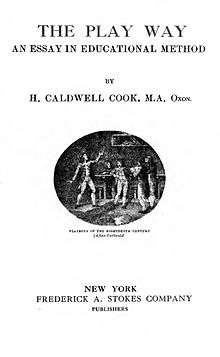Henry Caldwell Cook
Henry Caldwell Cook (1886–1939) was a British educator known for his book The Play Way, which contended that doing was a better learning method than reading and listening, and that youth study through play.
Henry Caldwell Cook | |
|---|---|
| Born | 1886 Liverpool |
| Died | 1939 (aged 52–53) |
| Occupation | Teacher |
| Known for | Youth play as study (The Play Way) |
Early life and career

Henry Caldwell Cook was born in Liverpool in 1886.[1] He attended a St. John's Wood prep school, Highgate School in London, and Lincoln College in Oxford.[1] He received second class honours from the school of English language and literature in 1909 and an Oxford Diploma in Education with distinction in 1911.[1]
Caldwell Cook served as the English master at the Perse School in Cambridge from 1911–1915 and 1919–1933, and served his country with the Artists Rifles division in France.[1] During this time, he wrote Littleman's Book of Courtesy (1914) and The Play Way, an Essay in Educational Method (1917), his magnum opus.[1] Caldwell Cook saw the current schooling system to impede "true education".[1] He used drama to teach English,[2] building a room, called 'the Mummery', in his school based on an Elizabethan theatre, and students improvised plays based on dramatic literature.[3] This idea had been used and publicised by Harriet Finlay-Johnson.[4] He called this method the "play-way".[2] The Play Way, the book, argued that learning came from experience doing instead of from listening and reading: "The natural means of study in youth is play."[1] The claim was debated for a generation.[1] The book began as articles for The New Age in 1914 destined for the "Papers for the Present" series, but became a book reflecting on his experience at Perse.[5] A 1922 unpublished Board of Education report made the recommendation to not support grants for his program or its imitators.[2]
In 1939, he died a bachelor "in comparative obscurity".[1]
References
- Aldrich, Richard; Gordon, Peter (1989). Dictionary of British Educationists. Woburn Press. p. 60. ISBN 978-0-7130-0177-8.
- Bresler, Liora (4 April 2007). International Handbook of Research in Arts Education. Springer. p. 48. ISBN 978-1-4020-4857-9.
- Booth, David Wallace (1978). An Examination of the Relationship (PDF) (Thesis). Archived (PDF) from the original on 29 October 2013. Retrieved 29 October 2013.
- Process Drama in Education, Gustave J. Weltsek-Medina, 2008, Retrieved 30 January 2016
- Scott, John; Bromley, Ray (1 June 2013). Envisioning Sociology: Victor Branford, Patrick Geddes, and the Quest for Social Reconstruction. SUNY Press. pp. 145–146. ISBN 978-1-4384-4731-5.